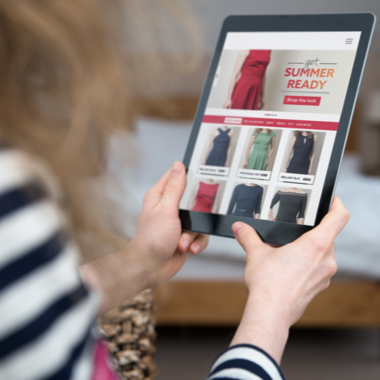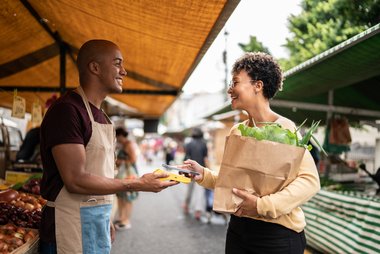
- Four minutes read
Why Black Friday will be a catalyst to re-thinking the online checkout
The UK is heading into Black Friday and Cyber Monday weekend with all non-essential stores closed, meaning that consumers will need to search online for holiday season deals. How these shoppers pay, and who they choose to buy from, could re-shape the eCommerce checkout for UK retailers permanently.
Last week the UK Government announced that all stores would be opening on December 2, giving consumers hope that the high street will be operating for at least part of the Christmas shopping season.
But for many, that season begins with Black Friday weekend, which has grown in popularity in the UK in recent years. For example, according to data from Barclaycard, UK sales during the week of Black Friday rose 16.5% in value and 7.2% in volume last year. The UK high street also saw an increase in footfall during the same week for the first time since 2014.
All non-essential stores will be closed in England across Black Friday weekend as the country remains in lockdown, meaning this will be an online-only event in 2020. And with so many shoppers turning to eCommerce this weekend as a result, perhaps for the first time, will this have a long-term impact on retailers?
Why Black Friday may be a turning point
For eCommerce retailers, capitalising on festive season campaigns such as Black Friday is a hug opportunity. And this year the spike in online traffic and sales should be even more significant, due to the volume of consumers that are shopping online during COVID-19. In April we commissioned consumer research for our Lost in Transaction report series, and of the 1,000 consumers that were questioned in the UK, 43% said they were shopping online much more frequently now due to COVID-19 restrictions. Additionally, 21% of UK consumers told us that they had actually shopped online for the first time since the outbreak of the pandemic. This not only means online retailers have more potential customers to appeal to, it is also changing what the make-up of these customers is.
And while some have recognised this and planned accordingly, many online businesses are yet to re-think their offering or strategy in the wake of this change, specifically with regards to customer experience at the checkout. This year’s Black Friday could be the turning point for online businesses forcing them to evaluate their checkout experience and assess whether they are catering to the changing demands and expectations of consumers.
Consumer habits at the checkout are already changing
In September we commissioned a global survey of over 1,100 online businesses to gauge how they had already been impacted by COVID-19, and the plans they were putting into place to survive and thrive beyond the COVID-19 era.
eCommerce retailers confirmed that they have already begun making upgrades to their checkout options following the onset of the pandemic. Over three quarters of UK businesses (78%) told us that they had offered consumers new ways to pay, including accepting contactless payments upon delivery. Over a third (37%) had integrated at least one new payment method into their online checkout.
And there is compelling reasoning for doing so. Three quarters of UK online retailers (75%) said that they had already noticed a change in the way consumers were making payments since the outbreak of COVID-19. The most significant difference (identified by 37% of businesses) has been the increased use of digital wallets. This is reflected in our consumer survey; 54% of UK consumers told us they had used a payment method for the first time during COVID-19 and 12% of consumers told us that they had used a digital wallet for the first time since the outbreak of the pandemic.
Concerns about security of financial data is still the most important issue
Consumers already demonstrating an appetite to use alternative payment methods isn’t the only reason online retailers must consider updating their checkout. Many of the most common issues online businesses traditionally face have also been exacerbated by the pandemic. 54% of UK online businesses said they had noticed an increase in cart abandonment rates during COVID-19, and not being able to pay with their preferred payment method is one of the most identified reasons for doing so.
Worries about the security of financial data are also preventing consumers, particularly those that are new to shopping online or sharing financial data with unfamiliar retailers they have no previous relationship with, from completing transactions. Three-in-five businesses (60%) say COVID-19 has resulted in consumers being more concerned about being a victim of fraud and the same percentage believe that consumers are increasingly looking to make payments online using methods where their financial details are not shared.
Online retailers that haven’t expanded their checkout options already are more likely to come up against these challenges throughout Black Friday and the rest of the festive shopping season. The success of those that have may spur those businesses that are yet to upgrade to do so.
The long-term outlook
Over a third (36%) of UK consumers have already committed to shopping online more even when COVID-19 is no longer a factor in their decision making and a further 24% are undecided. This is in the main an acceleration of a pre-existing shift to eCommerce that brands will need to adapt to, by speeding up their own digital development plans to futureproof through checkout upgrades.
Overall 60% of businesses agree that offering more payment methods now is more important than ever, for other businesses the impact of Black Friday may accelerate them coming to the same conclusion.




